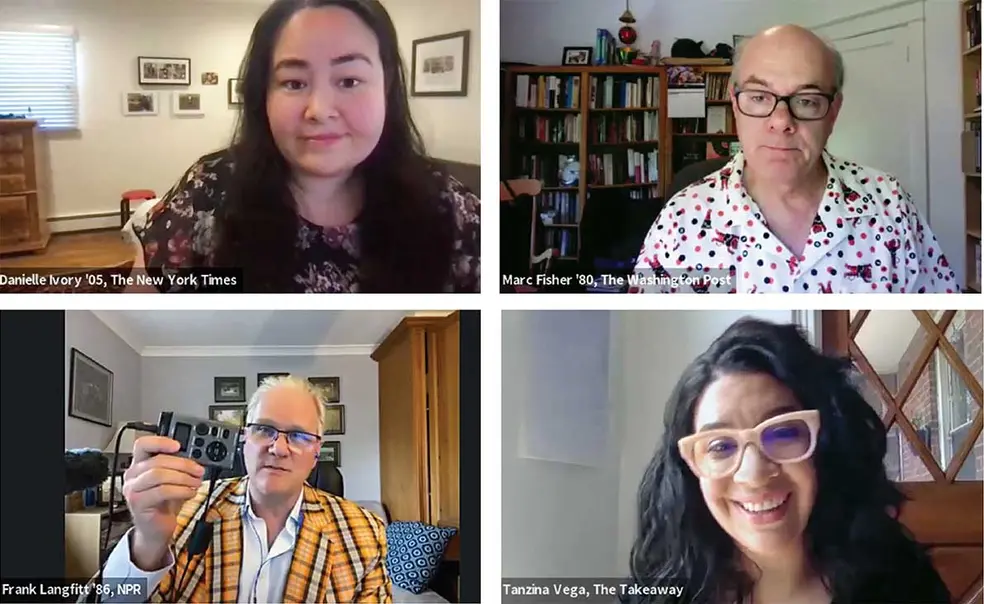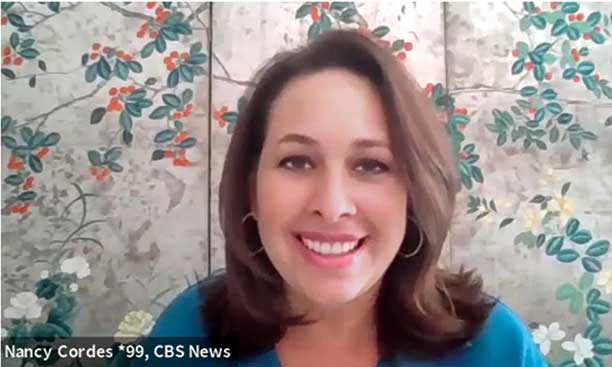Reunions Panels Took on Journalism, Free Speech
Five journalists weighed in on the pandemic and a tumultuous year in politics around the world at a panel called “Phew! What a Year: Journalists Review the News and How it Was Covered.” The event — co-sponsored by PAW and the Program in Journalism — was one of several that dealt with misinformation, newsgathering, and free speech.
Panel moderator Nancy Cordes *99, the chief White House correspondent for CBS News, said she thinks of the past year as “the three I’s: impeachment, the insurrection, and inauguration.” Outside of politics, of course, was a fourth: infection.
NPR’s London correspondent Frank Langfitt ’86 expressed concern that QAnon conspiracy theories have jumped the Atlantic and are germinating in the United Kingdom. “This is one of the great challenges we face going forward,” he said. “At no point in my professional lifetime have we ever dealt with an environment in which you talk to people, and you can’t agree on very basic facts.”Danielle Ivory ’05, a New York Times investigative reporter who was on the team that won a Pulitzer Prize for its reporting on the pandemic, said even meticulous fact-checking is not enough to curtail public distrust. She discussed one of her stories that used “bulletproof data” to show that vaccination rates were the lowest in counties that had supported Donald Trump. “Then I spent like the next three weeks getting really just the angriest emails I’ve ever gotten in my entire life, and Twitter DMs and social-media responses saying that we were liars.” She concluded: “I don’t really know what the solution to that is.”
Marc Fisher ’80, senior editor at The Washington Post, said he believed Trump’s most successful gambit was in creating a fissure between the public and the media. “He tried to do this for many years, even before entering politics, and I think it worked because there was already a deep mistrust; there was already crisis of credibility that journalists had been moaning about for decades.”
The cacophony of tweets exacerbates this disconnect, Fisher said. His solution has been one of radical responsiveness. “No matter how crazy, no matter how wild and insane in their ranting, I respond to all of them,” he said, referring to people who contact him via email and Twitter. “In well north of 90 percent of cases,” commentors tend to come back with kindness and apologies. “I think it’s important that we listen to and honor what people are saying, even when they are speaking from places of extraordinary rage and hatred,” he said.
COVID-19 “forced innovation on NPR, and forced more innovation on me.” — Frank Langfitt ’86
All the panelists have had to figure out how to deal with falsehoods, they said. Tanzina Vega, former Ferris Professor of Journalism and host of public radio’s The Takeaway, noted that her show’s protocol evolved from airing a falsehood and immediately correcting it, to not airing it at all. “It was irresponsible to air a clip of something that was not true, regardless of who said it,” she said. Others agreed that during the Trump years, many journalists became more comfortable with calling out lies than ever before.
The journalists also discussed how COVID-era distancing affected news gathering, which has long relied on shoe-leather reporting. Langfitt and Vega expressed awe at how seamlessly they were able to pivot to home-based reporting. “This forced innovation on NPR and forced more innovation on me,” said Langfitt. “If you told people at NPR two years ago they can produce a daily broadcast with almost nobody in the building, they would have said it was impossible. ... Everybody learned how to do this all on their own.”
Ivory said she found that reporting and writing from home, in many ways, helped her to work more efficiently. But Fisher expressed a sense of loss for the “mothership” — his Post newsroom. “So much of my work depends on serendipitous contacts with people in the newsroom,” he said, describing the ways reporters discuss articles, make contacts, and help each other shape stories.
A panel called “Free Speech, Cancel Culture, and Viewpoint Diversity,” moderated by McCormick Professor of Jurisprudence Robert George, director of the James Madison Program, dealt with a related thread in the fabric of the American conversation.
George began the session by citing “concerning” reports that a UNC Chapel Hill journalism professor may have been denied tenure for her role in The New York Times’ slavery-focused 1619 Project.
“It is possible for progressives like Professor [Nikole] Hannah-Jones to be victims of political decision-making,” George said, “and it is no less wrong when it happens to them” than to conservatives.
The cancel-culture problem exists on both sides of the political spectrum, but it’s far worse on the left, panelists said. Harvard law professor Randall Kennedy ’77 said the current culture forbids offending some groups, but not others, such as evangelical Christians or Orthodox Jews.
“No one worries about how the believing evangelical kid is going to be hurt or offended,” Kennedy said.
In “Controlling the Message in the 21st Century: Does Free Speech Still Work?” First Amendment lawyers and the head of Facebook’s review board explored the question of how social-media companies control content on their platforms — and whether the government needs to get involved.
Discussing Facebook’s decision in January to indefinitely suspend then-President Donald Trump from the platform, panelists called attention to a suggestion by the company’s review board that Facebook should look more carefully at posts by “influential” people because of their ability to do harm. The panelists said that idea is in tension with the American idea that voters need to be informed about what their leaders say.
The many proposals for government regulation of digital and social-media companies appear to conflict with the First Amendment, panelists said. For example, the Supreme Court has said that a state cannot require a newspaper to provide equal space for a response to previously published criticism — a ruling that could threaten Florida’s recently enacted statute that would prevent online companies from suspending political candidates in the final days before an election. Panelists said the current free-speech debate is very different from past cases where the government was the principal threat to free speech.
“Troll armies and the explosion of fake news and disinformation are as much a threat as government suppression ever is,” said Philip Bobbitt ’71, a Columbia University professor. “In crafting a response, we are in uncharted territory.”
Kevin Baine ’71, a lawyer who has represented media companies and universities on First Amendment issues, said there has been a significant shift in the commitment of young people to free speech over the past 10 to 15 years, “in part because of the things they see on social media.” There is a need to educate people in how to distinguish fact from fiction, he said, and to treat people of different views with respect and understanding. “That, of course, is the mission of places like Princeton,” he said.











1 Response
Ken McCarthy ’81
4 Years AgoLack of Confidence in Journalism
Interesting report on the journalism, free speech panels from the virtual reunion.
Is it really true the name Julian Assange did not come up?
Also the fact that news outlets like CNN, NBC, Yahoo, The Washington Post, and Time are owned by tech companies and tech giants (AT&T, Comcast, Verizon, Amazon’s Bezos and Salesforce’s Benioff respectively) with their expected bias was not worth mentioning?
By any standard, this is a dark, dark time for journalism and the public’s lack of confidence in the products of the news industry is well earned.
That the panel was devoted primarily to self-congratulation — “Langfitt and Vega expressed awe at how seamless [NPR pivoted] to home-based reporting” — and the mounting of straw men like QAnon to try to explain away the low and declining trust Americans have in the news media was not inspiring.
The subject is important and deserved more serious consideration.